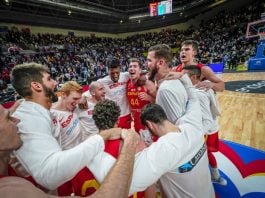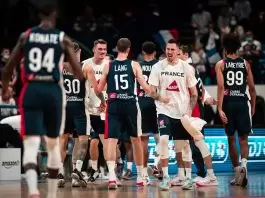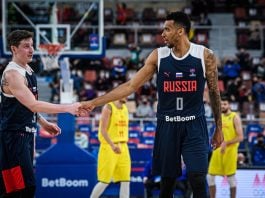Five years ago a Eurobasket bronze medal sufficed to seal automatic qualification for the Olympics as Lithuania booked tickets to Beijing after beating Greece in the third- place game.
This time around, it wasn’t enough.
With two coveted spots guaranteed only to finalists, last year’s EuroBasket in Lithuania promised to be a bump-and-grind affair featuring at least half a dozen title contenders, including Russia. Following an impressive nine-game winning streak, David Blatt’s team saw its unbeaten run come to an end in the game that mattered most. Tony Parker’s France proved too hard to handle. Had they beaten Les Bleus in the semifinal, Blatt’s men would have faced Spain in the championship game and, even more importantly, secured a berth in the coming London Games. The quick and athletic French team got the upper hand, though, setting up a replay of the Russia vs. Macedonia tie for bronze. Having beaten the Macedonians in group stages, Kirilenko & Co. worked hard to edge the sensational Balkan underdog again and ultimately won their second European medal under Blatt in four years. However, the Kaunas bronze was a consolation prize for the team that now had to work its way to the 2012 Olympics via qualifying tournament.
In Caracas, Russia cruised to four wins in as many games, securing a spot in the Olympic tournament which kicks off July 29. Towering head and shoulders above its opponents in Venezuela, Russia’s biggest worry in the qualifiers was Timofey Mozgov’s ankle injury that forced the 7-1 center to miss the key game against Nigeria. However, the sprain was mild and with Mozgov back in the fold, Blatt is bringing to London one of Russia’s strongest squads in years. It is a huge relief for the Israeli coach who in recent years has often struggled to patch up his roster.
Perennial roster problems
Since the 2008 Olympics, Blatt’s squad for various reasons regularly missed at least one of its three star players – Kirilenko, Holden and Khryapa – and with Holden permanently gone it was only last fall in Lithuania that Blatt was able to field again its pair of star forwards.
The impact was immediate as Russia powered to the semis on an impeccable 9-0 record, and then fell short of making the final.
This year, Kirilenko and Khryapa are back, on the heels of a very solid club season that was just a basket away from being labeled phenomenal – CSKA Moscow clinched Russian and VTB league titles before spoiling an otherwise unblemished record with the stunning loss in the ULEB Euroleague final. Come June and the two forwards put national team jerseys back on for a month’s worth of practice in Lithuania and the United States before taking the trip to Caracas.
Making the final cut for the Olympics eventually proved to be a job too difficult for heavily-favored Greece and an ambitious Macedonia. Not for Russia, though.
David Blatt once again proved that effort and commitment will always be there as long as he stays in charge, and his players’ execution was nearly flawless. In all four encounters Russia controlled the game, offering not even the slightest hint of doubt this team could falter in Venezuela. There certainly were episodes when things got rough (if you missed it, check out Nigeria’s fourth-quarter rally in the semi, for example), but Blatt’s team never lost control.
“Many things can be said about our team, but one thing is for sure – we come to play every night, without exception. Come game time – we’re ready.” This is not a particular Blatt quote, but actually the Israeli coach’s mantra that he echoes every year, at every tournament.
The Olympic draw sent Russia to a weaker group with only reigning European champion Spain seeming hard to beat, but made its further advancement rather tricky as any of the four powerhouses – U.S.A., Argentina, France and Lithuania – slated to clinch the quarters from the other group would provide an incredibly tough matchup for Russia. Despite certain skepticism in Moscow, Russia’s prospects for making history in London look healthy.
Holden’s departure did leave a gaping hole in the playmaking spot and Blatt’s strategy to entrust that role to a group of players led by Sergei Bykov partially offset the negatives. However, with Bykov sidelined long-term with a knee ligament injury, Blatt’s choice is currently narrowed to 2007 European champion Anton Ponkrashov and inexperienced Dmitry Khvostov. An erratic shooter with a thirst for ball possession, Ponkrashov had had his share of mistakes in the past, but Blatt still relied on him in a backup role and his choice was more often worth it than not. Ponkrashov’s inconsistency may hurt the team as he alternates excellence and failure, and it remains to be seen whether occasional flashes of brilliance can outweigh lapses into mediocrity.
At 22, Khvostov has not been playing big minutes at major tournaments and the Olympics certainly isn’t going to bring radical change in that department. Though Blatt has indicated he’d be happy to continue coaching Russia beyond London, even if he does he’ll hardly stay in charge until Rio in 2016, so this is probably his last Olympic tournament with Russia and he’s unlikely to experiment with Khvostov in key games, but could certainly assign him minor roles when resting his leaders against weaker opponents.
Blatt bets on Shved
That is why CSKA Moscow’s NBA-bound Alexei Shved (rumored to be a couple of days from being signed by the Minnesota Timberwolves), has been groomed for the point guard role, which he partially already filled at club level. Shved’s meteoric rise in 2010/11 was arguably CSKA’s largest new asset in a disastrous season.
Encouraged to fill a bigger role by his then mentor Dusko Vujosevic, Shved stepped up and continued to thrive during his breakout season under interim coach Dmitry Shakulin and his successor Jonas Kazlauskas after CSKA parted ways with Vujosevic following a failed Euroleague campaign. Emerging as one of CSKA’s key players in the season-saving championship series against Khimki, Shved capped his outstanding run by helping Team Russia win the bronze medal at EuroBasket 2011.
Shved’s story portrays the triumph of character: after failing to make the cut two years ago Shved missed the FIBA World Championship in Turkey, but overcame his disappointment and worked hard to earn Blatt’s invitation for EuroBasket 2011.
“Nigeria is a strong, powerful team, like our Sasha Kaun, only they’ve got 12 players like him. It was difficult – we built a 20-point cushion, but they rallied to stay in the game. We stuck all together, mobilized our willpower and won. Nobody wanted to play for the third place. Next time we play – it will be the Olympics,” an emotional Shved told R-Sport news agency after Russia’s key win against the African team.
His fortes include explosive first step, lightning speed, exceptional leaping ability and a penchant for attacking the rim.
Basketball purists insist Shved is a shooting guard who adores to drive, but there is more to his talent than just the ability to slash the opponents’ defense in the paint and Blatt knows it. Shved’s conversion to point guard may have been forced, but it was far from futile. How well he fares in London will greatly depend on how fresh he can stay in the final stages of the game. Playing 30+ minutes every night in a fast-paced, compact tournament is a demanding test of fitness and mental stamina.
Facing physical, athletic opponents such as U.S. or French guards, for instance, able to tenaciously press from the opening tipoff until the final buzzer, is sure to wear any man down, including Shved, and the fluidity of Russia’s offensive plays will hinge on how much gas in the tank the young guard’s got left after going through tough matchups.
Russia’s starting lineup in Caracas clearly indicated that Blatt is comfortable with Shved in the point guard role and the 23-year-old is sure to have some load in setting up plays taken off his shoulders by Khryapa, one of the best perimeter passers in the game globally. A truly unselfish, team-oriented veteran with NBA experience, the CSKA captain has over the years used his exceptional court vision and the ability to make a smart, timely pass to earn the reputation of Europe’s best point forward.
When Russia spreads the floor, its offense flourishes as Khryapa, Shved, Kirilenko, Fridzon and Monya are all able to make a long-range basket. If not raining three- pointers as in the Caracas semi against Nigeria, Russia can switch to making trouble in the paint where big men Mozgov and Kaun are often joined by Kirilenko whose intelligent backdoor cuts are almost impossible to defend.
Stifling opponents in the paint
However, offense has never been the biggest strength of this team. “We win games on our half of the court,” another favorite Blatt quote. With mobile guards patrolling the perimeter and quick, long and tall frontcourt players crowding the paint, Russia’s stifling help defense around the basket is almost flawless and it’s no wonder that Blatt’s squad last year limited its EuroBasket opponents to 65.7 points per game. The pace-setter, undoubtedly, is Kirilenko – officially Euroleague’s MVP and best defender in 2011/12, versatile, intelligent player who can do virtually anything on the floor making split-second decisions while others still take time to think. His smart plays and leadership skills coupled with a humble personality and team-first mentality provide that rare breed of a superstar that Blatt, a deep believer in team effort, needs to lead his squad on the floor. And Kirilenko delivers, doing whatever his team needs him to do: rebounding, assisting, scoring, stealing the ball, you name it…
All of this doesn’t mean Russia is not vulnerable. Blatt would still prefer if his players made more free throws, committed fewer turnovers, displayed more aggression on the glass and collected more boards. The ability to fight it out in the paint will come in handy especially against rugged, battle-loving opponents such as Australia and Brazil, while China will try to counter Russia’s fast-paced game with its own brand of mobile, run-and-gun basketball. If they play to their potential and edge these three teams plus Great Britain, Blatt’s men will set the scene for the Group B top spot decider against the star-studded Spain.
Two weeks before the Games’ start, Blatt faces a task almost as tough as beating Sergio Scariolo’s European version of Dream Team: he needs to fine-tune his team’s preparation in order to reach a second peak of form within a single month. The Caracas qualifiers will certainly have left its mark on a squad that had to absorb the impact of acclimatization and time zone change twice in three weeks and will now have to work hard to regain freshness. What they lack physically, Russians should be able to compensate for mentally as they strive to make historic success and clinch the country’s first Olympic medal after the breakup of the Soviet Union.
“I’m very happy that we’re there. We did a very, very tough job during the last two months and we earned this spot,” Kirilenko, who in London will be playing at his third Olympics, told FIBA TV. “Believe me, it’s not easy at all. I give credit to Nigeria who fought until the end. We’re in good shape right now, but we need a little break. Over the last month we worked really hard thinking about this [Olympic qualification] tournament, but now we need a week at least to get it out of our heads and start all over.”
In what could be his last hurrah with this team, Blatt himself will be motivated as ever to make another indelible mark during his six-year tenure as Team Russia head coach. Appointed in March 2006, a year and a half later he guided Russia to its biggest success in the post-Soviet era as his team clinched European gold in Madrid. In the final the Israeli coach’s squad stunned heavily-favored hosts Spain as U.S.-born point guard John Holden sank Russia’s winning basket with two seconds remaining on the shot clock. Russia won 60-59.
The gold medal at EuroBasket 2007 automatically sealed Russia’s spot in the 2008 Olympics, but Blatt’s squad, featuring Khryapa who played through injury, underperformed in Beijing, winning only one of five games in the group stage. Russia beat Iran in the opener and then suffered four consecutive losses against Croatia, Lithuania, Australia and Argentina.
London 2012 now offers an excellent chance for redemption.



